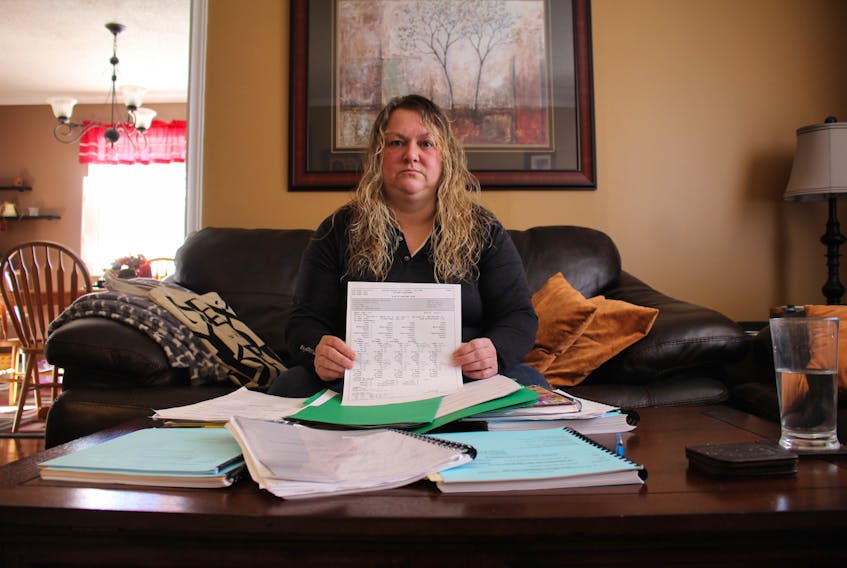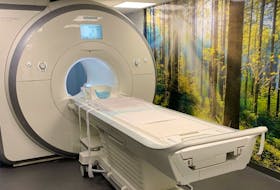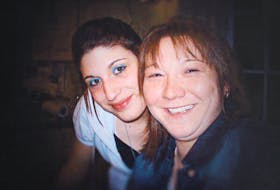GRAND FALLS-WINDSOR, N.L. — After years of battling a system she feels is set against her, Jocelyn Gedge is running out of options.
“The problem is, basically, that there is absolutely nobody helping me with my situation,” she told The Central Voice. “There was no investigation done about what happened to me during the day of May 12, 2014, which was the day that basically ruined my life.”

Gedge, who was working as a registered nurse for Central Health at the time, says she went to the Central Newfoundland Regional Health Centre in Grand Falls-Windsor for gall bladder surgery that day, but something went wrong, and she woke up not being able to see out of the centre of her eyes.
“As soon as I went back to the room and I was back on the bed, I was all drugged up, but at the same time, I looked at my boyfriend and said, ‘I can’t see you right.’”
The problem persisted when she went home later that day.
“My mom was bringing me up some homemade bread. She brought it up and she sat at the end of my bed, and I said, ‘Mom, I can’t see you right.’”
Gedge said she can no longer see things in the centre of her field of vision, something that makes reading – and thus her job – nearly impossible. Though she was employed by Central Health at the time of the surgery, she had not opted for long-term disability coverage when she signed on. In 2017, she resigned the position in order to access some of her pension.
Without long-term disability insurance, and unable to work, she has been struggling. Most frustrating, she says, is feeling she’s being ignored by Central Health, several politicians she turned to when she failed to make the health region she her case, the College of Physicians and Surgeons of Newfoundland and Labrador, and a judge when she appealed the college’s decision.
“I’m unable to get a hold of anybody to help me,” she said. “I’m not happy. I’m a voter, and I worked for the government. I thought they would want to hear the story, because so many people do not tell the story about the problems they have with Central Health.”
Under pressure
In the process of trying to find out what had happened during the surgery, and after filing a complaint with the college concerning the anesthesiologist who treated her, Gedge obtained a copy of parts of her chart from that day, including the readings from a machine that checks the vitals of patients undergoing surgery every 15 minutes. She shared it with The Central Voice, and it indicates that her blood pressure rose from 117/57 at the beginning of surgery at 10:30 a.m. to 240/112 45 minutes later. Her levels stayed very high until the noon reading – 45 minutes after the peak – when they fell to 137/58. An ideal blood pressure for an adult is anything from 90 to 120 over 60 to 80.
Perhaps most egregious to Gedge is that the chart does not indicate that anything was done about this sustained spike.
In fall 2014, prior to obtaining the chart information, she was referred to a retina specialist in St. John’s who suggested a stroke may have caused the vision loss. After seeing the blood pressure numbers, Gedge believes that was indeed the cause. She also did not wake up right away from the surgery, she says.
“At this time, I know – because I’m a nurse, I worked there, I have friends – that I was going to ICU. I was on life-support,” Gedge said.
“When I was looking for this part of the record, I couldn’t get anything. They said there was nothing there. No notes, no nothing.”
Due diligence
Gedge says she then started what has become a nearly five-year mission to find out what happened and to hold someone accountable.
She says she began by filing a complaint with the client relations office at Central Health but was unable to get all the information she wanted. By then it was several years after the incident. She then took her complaint to the College of Physicians and Surgeons of Newfoundland and Labrador in September 2015, but they ruled against her. She appealed the ruling, which is a process that happens before a judge, but her appeal was denied in March 2018.
“Trust me, I’ve crossed my Ts and dotted my Is,” Gedge said. “I’ve done everything that I can before I got to this point. But now I have absolutely nothing to lose.”
Gedge said she got a verbal response from Central Health’s client relations office indicating it had been a learning experience and that staff had been advised to be more diligent about recording things on patient charts.
“I said, ‘A learning experience? This isn’t a learning experience on my behalf,’” she said, tearing up. “This is my life. I thought that was sort of a smack in the mouth.”
Proper procedure
According to Ross Rowsell with Central Health’s corporate improvement department, the standard procedure for closing a client relations complaint file is a disclosure in writing to the patient. That would be the case whether or not an internal investigation turned up evidence of a mistake or problem with the care provided.
Neither Rowsell nor Central Health is permitted to comment on individual cases because privacy laws prohibit it.
“Typically, if somebody do have a concern with regards to any service delivery, it could come in various forms,” Rowsell told The Central Voice. “It could come through a client expressing a concern through our client relations, but often if somebody do have a concern, we do try to address that at the front line.”
If someone has a complaint they want to make after they leave the hospital, they are encouraged to contact the client relations office, as well. This triggers a conversation with the unit in question and the staff there on the day in question. The same process is followed for compliments, though those are fewer.
If indeed an “occurrence” is found to have taken place — something out of the ordinary, which could have led to patient harm or potential harm — there is another process.
“We do have an internal investigation system, or process, for investigation of occurrences,” Rowsell said. “Hopefully things don’t go wrong, but if things do go wrong, then we do have a formal investigation process from that occurrence perspective.”
Sometimes those occurrences and the resulting investigations shed light on human error and sometimes they find problems with processes, which can be improved.
“We try to make things as bullet-proof as possible so that potential error can’t happen in a busy unit,” Rowsell said. “If there is harm, obviously we do that disclosure, we have that meeting with the patient, as well as whoever’s working that shift that day….
“That’s an ever-evolving process, we’re always trying to make that better as we go.”
Central Health declined to provide the number of occurrences it has investigated in recent years. Investigation materials are protected by privacy legislation, but any recommendations that come out of an investigation are available to the patient involved.
“We can investigate to our level of investigation, and obviously if that individual is not pleased with the outcome, I guess they look to other avenues to further investigate, depending on what the incident or occurrence was,” Rowsell said.
Those other avenues can include professional associations, like the College of Physicians and Surgeons or nursing licensing bodies, or – ultimately – a lawsuit. Central Health declined to provide the number of civil cases filed against them currently.
Next steps
For Gedge, part of her motivation for coming forward was concern for others who might suffer harm through the health system. She is seeking advice on what she should do next, and is waiting to hear back from the politicians from whom she sought help.
“It’s been hell. I’m living in hell,” she said. “Even trying to fight the system, which is not easy for anybody, but for somebody like myself who has lost their career, I’ve lost my life.”
Since 2014, Gedge says she has been on blood pressure medication, as well as anti-depressants and anti-anxiety medications.
“Because I feel that I have failed. I feel that nobody is wanting or willing or even trying to help me,” she said. “When you’re not bringing home your income and working as a registered nurse, as I should be… I feel they’ve robbed me of my life. They robbed me of everything that I could have had with my income, and I loved being a registered nurse.”
Client relations stats 2018
Total Care and Treatment
Compliments 62 57
Concerns 568 171
Inquiries 64 16
Source: Central Health
Focus on feedback
There are several ways in which Central Health is gathering information about patients’ experiences and involving them in the process.
The health authority is putting together a patient advisory council, which will see 12 patients and three staff members form a body to advise the organization.
Central Health is also looking at the possibility of involving patients in interviewing potential new hires, and they have begun sharing patient stories at board meetings.
The health authority currently conducts patient surveys and takes both complaints and compliments through its client relations office, which can be reached at 709-292-2272 or [email protected].









